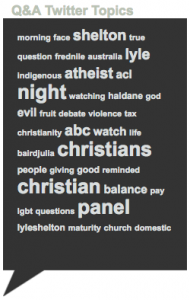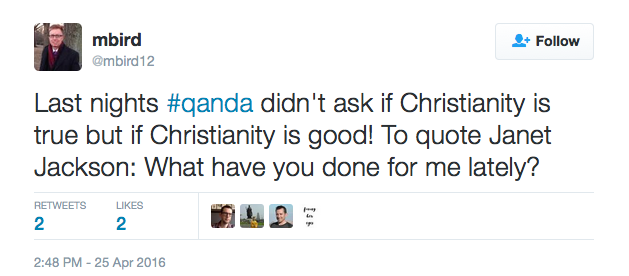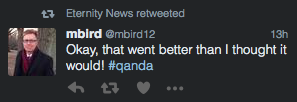Not much Jesus but “not as bad as we thought”: verdict on last night’s Christianity special on Q&A
Jesus didn’t rate much of a mention in last night’s Christianity panel on ABC’s Q&A. In the 1 hour 7 minute show, the words “Jesus” and “Christ” were mentioned only six times.

The Q&A Twitter topics. No Jesus.
A special edition of ABC’s Q&A programme, discussing “church and state” and featuring an all-Christian panel, tackled questions of terrorism, war, religious freedom, climate change, indigenous reconciliation, and domestic violence in the church.
The panellists were Professor John Haldane, a Catholic philosopher, Julie McCrossin, an elder at South Sydney Uniting Church, Ray Minniecon, Chairperson of the Sydney Anglican Indigenous People’s Committee, Tiffany Sparks, an Anglican priest in Brisbane, and Lyle Shelton, director of the Australian Christian Lobby.
The closest the panellists came to a gospel message was through Australian Christian Lobby’s Lyle Shelton who, in addressing a question about domestic violence and conservative interpretations of what the Bible says about women and men, used up three of the mentions in that tally, saying, “The scripture says for the man, for the husband, to lay down his life for his wife … in the same way that Jesus did for the church. Now Jesus went to the cross, he died. That’s what a man is called to do for a woman. I think that’s the model we need and probably us men haven’t done a good enough job of exemplifying that Christ-like approach in our gender relations over time.”
Ray Minniecon, in answer to a question about whether is such a thing as “just war”, said “I’m against all wars, I don’t stand for any of those. I think Jesus’ teaching is very clear on that.”
We tweeted some more of the highlights:


On the question of indigenous reconciliation, Ray Minniecon said, “Every church in this country is built on stolen land.” John Haldane interjected, suggesting that “we need to be careful about the idea of God giving lands to anyone.” Lyle Shelton said, “there needs to be forgiveness and atonement both ways to be able to move forward.”
After discussing same-sex marriage, climate change, war and terrorism, John Haldane said:

Several Christians watching the show last night have remarked on how little Jesus was mentioned.
Murray Campbell, senior pastor of Mentone Baptist Church in Melbourne’s East, asked on his blog, “Why was an entire episode of a ‘Christian’ Q&A without any mention of the crux of the Christian faith, the Gospel of Jesus Christ?
“The entire program was addressing matters from a Christian perspective and yet where was a faithful and clear articulation of the Gospel, even in a single sentence?” asked Campbell. “The closest we came was when Lyle Shelton made passing reference to Christ laying down his life, and when Ray Minniecon called Australians to ‘repentance’.
“As Julia Baird summed up the final question, she gave the panel every opportunity. She asked, ‘is it down to God’s grace or human endeavour?’ There I sat, pleading, would some one please explain the good news of Jesus Christ? Would someone at least say, ‘yes, it’s God’s grace’. What an opportunity to articulate the truth and beauty and power of God’s grace, but no. I was saddened to hear no minister of the Gospel say yes to God’s grace,” wrote Campbell.
Dominic Steele, minister at Village Church Annandale in Sydney’s inner west wrote in a Facebook post, “It was disappointing that with five ‘Christians’ on the panel talking between themselves no one really clearly articulated at any point what it is that makes Jesus wonderfully compelling for them.
“The best moment for me, although it was in the difficult context of examining domestic violence claims, was the point when the program came closest to a reference to the gospel. When dealing with an adversarial question Lyle Shelton defended the biblical picture of the husbands’ role in marriage and spoke of Jesus sacrificial act of laying down his life for us (and then how husbands should model themselves on Christ). Sadly Lyle wasn’t given the chance to go on an outline how Christ’s actions were to pay for our wrong against the Almightly and that he then rose again as the ruler and judge,” wrote Steele.
Conversely, this morning Mike Bird, a lecturer in theology and New Testament at Ridley College in Melbourne, tweeted:

That was after his final verdict last night: 
Eternity’s verdict:
Best handling of a difficult question: Lyle Shelton defending Eric Metaxas on a comment Metaxas is reported to have made comparing Christian dissent during the rise of Nazism and Christian dissent in the rise of homosexuality. Shelton said,
“In 1930s Germany … [Eric wrote about the] situation where the church was becoming complicit with national socialism and the agenda of Adolf Hitler.
…
“I would agree [the point Eric was making] in terms of the church being silent about certain cultural trends and going along with things that are contrary to the teachings of the church, whether it’s on marriage or something like that.
“And that’s the context in which Eric was making that point, and I think it’s a good point, because I’m very concerned that the church isn’t speaking up enough, on this issue because it’s a big social justice issue, it’s a big public policy issue, and it has implications for the future of society, for freedom of speech, freedom of conscience, freedom of religion … and particularly for the freedom of children to be allowed wherever possible to know their mother and father, and this is the sort of public policy that will change that.
…
“It wasn’t likening homosexuality to Nazism, that’s the conflation unfortunately. It’s the issue of whether the church will speak on an issue of social justice.”
Most insightful comment: John Haldane who, in answer to a question of whether change in the world is a result of God’s grace or human endeavour, said, “One difference that Christianity makes … not that it makes things better … but it recognises our fallibility. And I think that that should induce a humility about the ‘human endeavour’. That understanding that we can do our bit, but for the Christian, this is a work of divided labour. And God has to do his bit. And I think that appropriately limits our efforts. Not in the sense that we shouldn’t try for the best, but we should recognise that even our very best efforts are liable to fall short and therefore, as it were, to hand over to God, for him to make his contribution also.”
Best parting shot: Julie McCrossin, who said in the last comment of the night, “When two or three of us are gathered together in His name, something quite special happens that I don’t think happens at Liberal and Labor party branch meetings. But I might be wrong.”
Email This Story
Why not send this to a friend?



